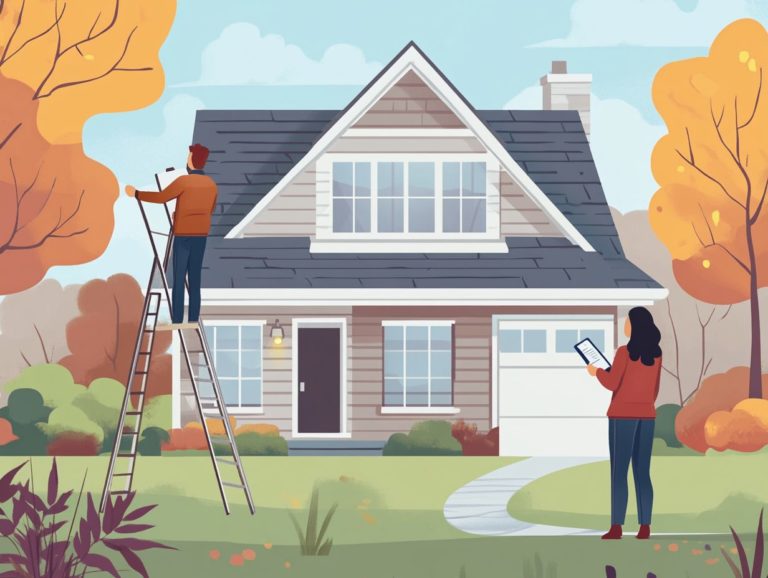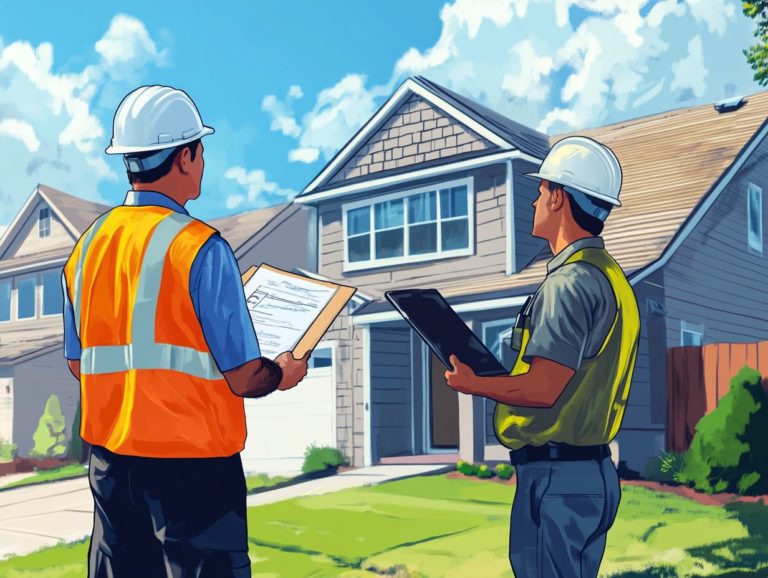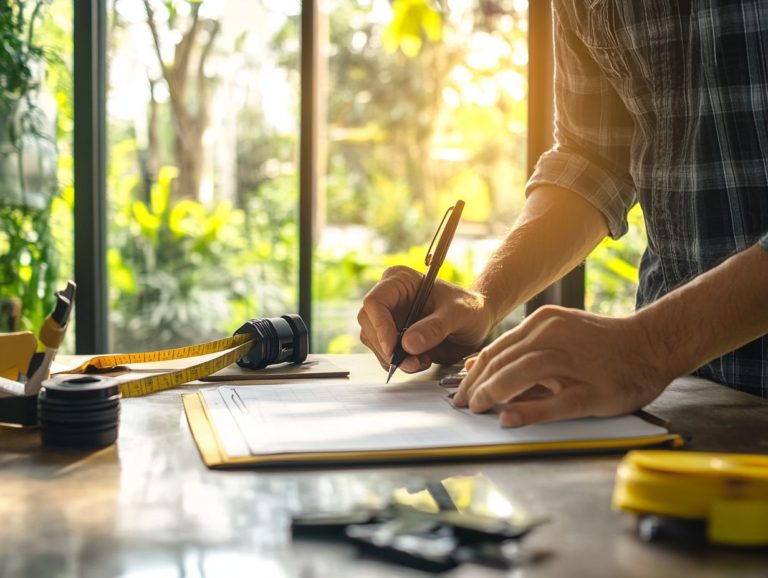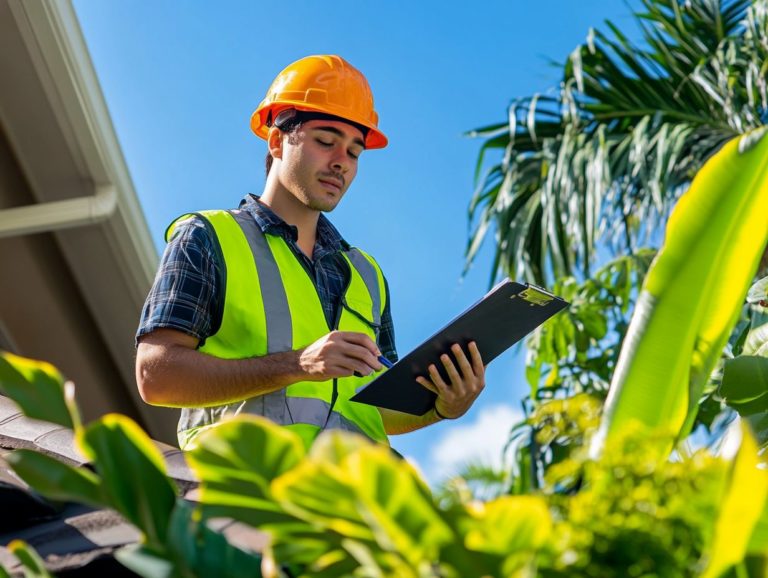The Importance of Home Inspections for New Homeowners
Buying a home stands as one of the most significant investments you will ever make, and it is essential to ensure that you make the right choice.
Home inspections play an important role in this journey, providing insight into what lies beneath the surface and uncovering potential issues that could lead to costly surprises down the line.
This guide will empower you to navigate the inspection process with ease and select a qualified inspector, giving you the knowledge you need to approach your home purchase with confidence.
Contents
Key Takeaways:
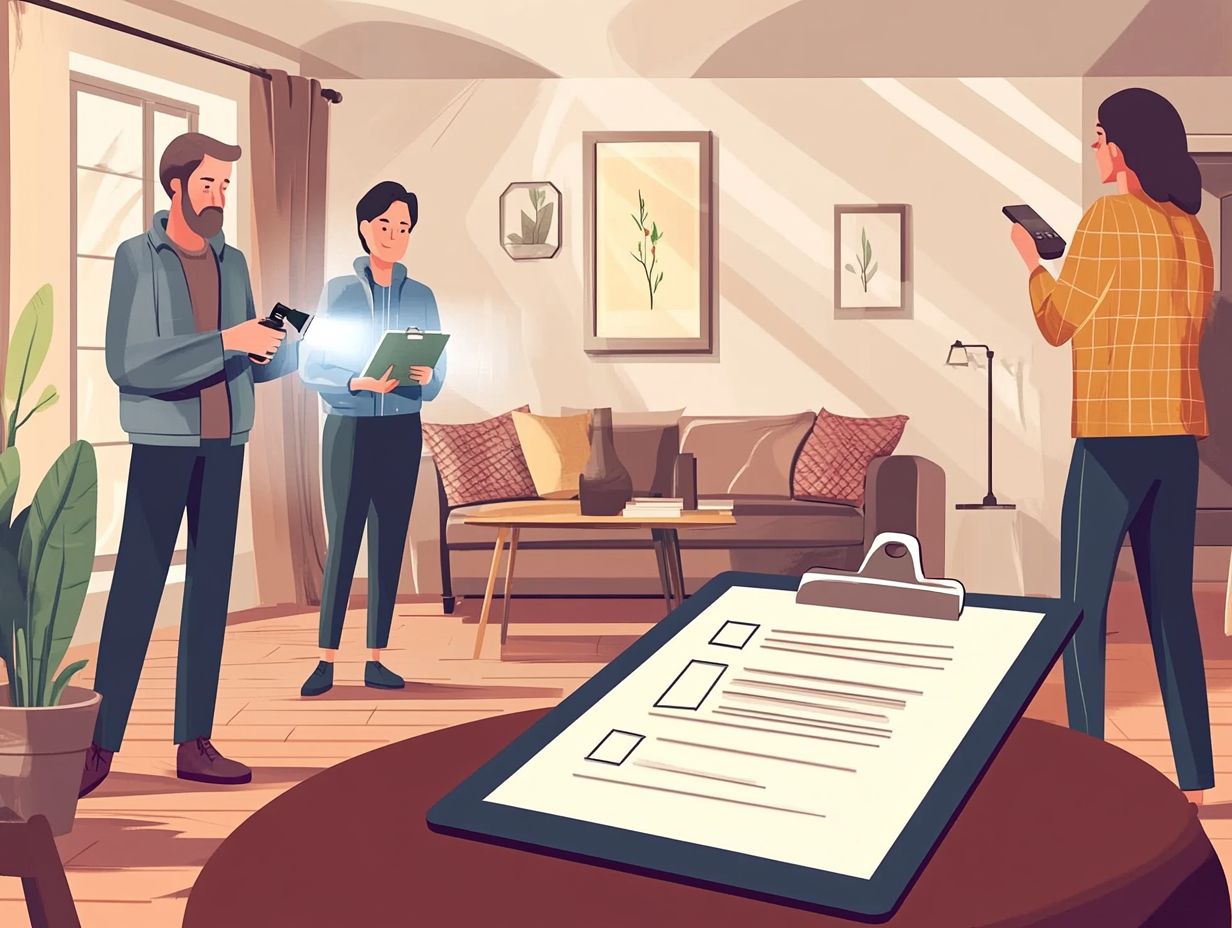
A home inspection is a thorough evaluation of the condition of a home, helping new homeowners understand any potential issues before making a purchase.
Home inspections can uncover costly and dangerous problems, such as structural, electrical, and plumbing concerns, highlighting the importance of home inspections for property buyers and providing financial and safety benefits to new homeowners.
When choosing a home inspector, consider their qualifications, experience, and reputation to ensure a thorough and reliable inspection for your new home.
Understanding Home Inspections
Understanding home inspections is essential as you navigate the home buying process, especially since the importance of pre-purchase home inspections can uncover potential problems that might lead to buyer’s remorse.
A thorough property inspection conducted by a certified home inspector is crucial, highlighting safety risks associated with various systems in the house, such as heating and cooling (HVAC), plumbing, and electrical systems, making it essential to understand the importance of thorough home inspections.
The insights from the inspection report can help you negotiate better, ultimately influencing the outcome of your real estate transactions.
What is a Home Inspection?
A home inspection is your opportunity to gain a comprehensive understanding of a property’s condition. It is performed by a qualified home inspector who specializes in uncovering hidden issues that could pose safety risks or impact the property s value.
This meticulous process involves a thorough examination of various systems within the home, ensuring you re well-informed before making a purchase. Inspectors assess HVAC systems to confirm they re functioning efficiently and check for any potential leaks.
They scrutinize electrical systems for outdated wiring or faulty connections that could lead to serious safety hazards. Plumbing issues, including leaks or blockages, are also closely examined to help you avoid costly repairs down the line.
Structural integrity is not overlooked either; cracks in foundations or roofs are evaluated to ensure the home is sound. By addressing these critical areas, you gain valuable insights into the property’s overall condition, enabling you in your decision-making process.
Why are Home Inspections Important?
Home inspections play a crucial role in the home buying process, helping you identify safety risks that could lead to buyer’s remorse. Understanding the importance of a thorough home inspection provides you with the leverage you need in real estate transactions.
By uncovering underlying issues such as structural defects, plumbing malfunctions, or electrical hazards, thorough inspections equip you with essential insights that can profoundly influence your negotiations. When potential concerns are documented, you gain valuable negotiation opportunities, allowing you to request repairs, seek credits, or even renegotiate the purchase price to better suit your needs.
Including an inspection contingency adds an extra layer of security, granting you the option to withdraw your offer if serious problems arise during the inspection. This ensures you make informed decisions before committing to what is often the largest purchase of your life.
The Process of a Home Inspection
The home inspection process unfolds through several essential steps. It begins with selecting a qualified home inspector, someone who possesses the expertise and experience necessary to assess the property thoroughly.
Once the inspection is complete, you will receive a detailed report that meticulously outlines the condition of the home, providing you with invaluable insights for your decision-making.
Step-by-Step Guide
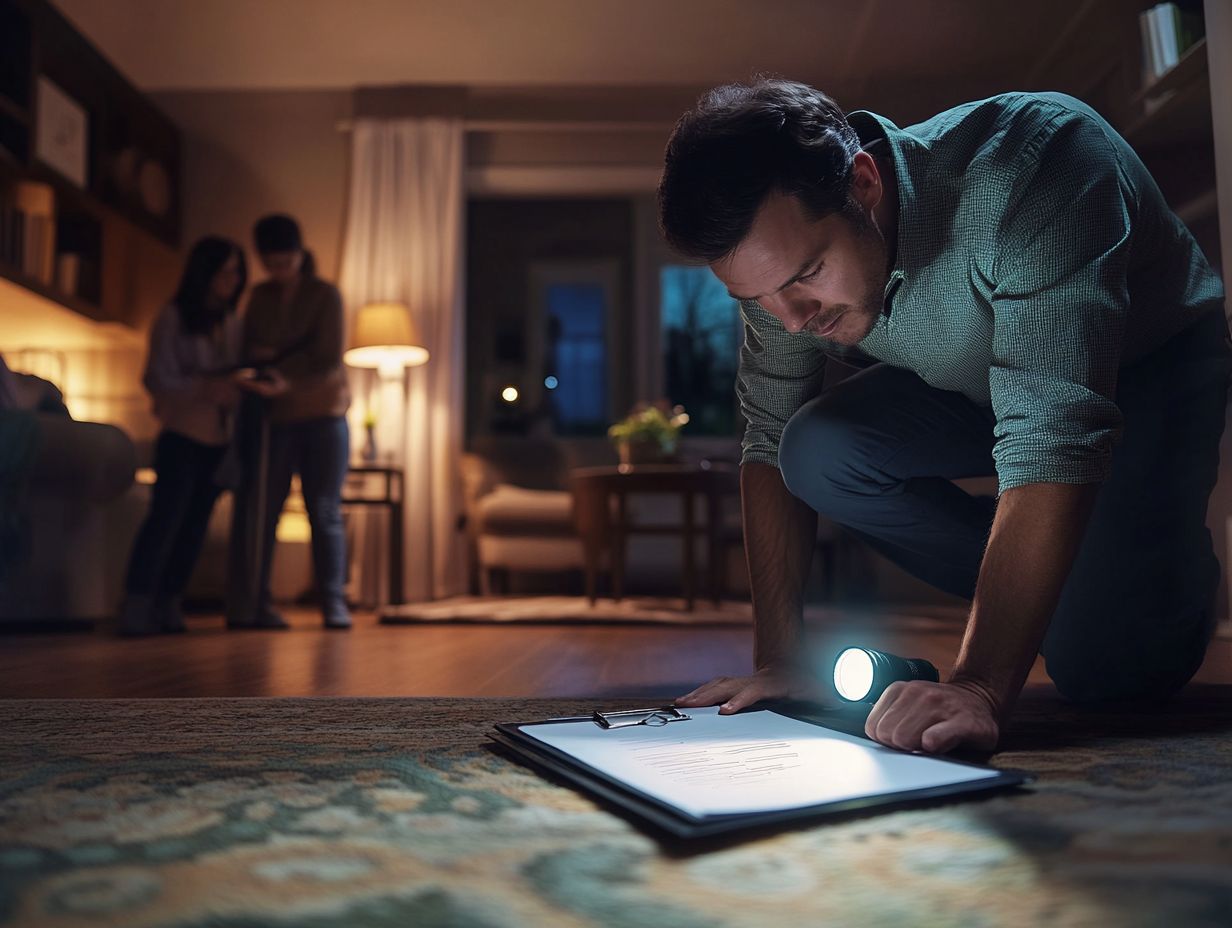
A step-by-step guide to home inspection helps you understand what to expect and how to communicate effectively with your home inspector throughout the process. From scheduling to reviewing the inspection report, each phase plays a vital role in your decision-making.
- Start by choosing a qualified home inspector and scheduling a time that works for you. Ensure your presence during the inspection. Being there in person allows you to observe closely and ask questions about any immediate concerns that arise.
- During the inspection, watch for potential issues, such as:
- Pest infestations
- Signs of electrical problems, like faulty wiring
- Plumbing issues, like leaks or drainage problems
- After the inspection, review the detailed report to gain insights into the home’s condition and necessary repairs. This knowledge empowers you to negotiate confidently!
Common Issues Found in Home Inspections
In home inspections, you ll often find common issues that can greatly affect both the value and safety of a property.
Structural concerns, electrical issues, plumbing problems, and pest infestations often take center stage. Addressing these problems is essential to keep your investment sound and secure.
Structural, Electrical, and Plumbing Concerns
Structural, electrical, and plumbing issues are important areas to check during a home inspection, as they can reveal significant safety risks and potential repairs.
If you overlook problems in these critical areas, you could face expensive repairs that may lower your property s value.
For example, compromised structural integrity may show through cracks in the foundation or walls, making your home unsafe. Likewise, outdated or faulty electrical systems can create fire hazards, with risks from improperly wired circuits or malfunctioning heating, ventilation, and air conditioning (HVAC) systems.
Plumbing issues, like leaks or old pipes, can cause water damage affecting both walls and ceilings, encouraging mold growth and creating an unhealthy living environment.
It s crucial for homeowners to understand these implications, as they directly impact safety and future resale value.
Benefits of Getting a Home Inspection
Choosing a home inspection provides numerous benefits. It can lead to significant financial savings by preventing unexpected repair needs and enhances your safety, ensuring a secure living environment. Understanding the role of home inspections for first-time buyers is crucial in making informed decisions.
Financial and Safety Advantages
The financial and safety advantages of a home inspection can reduce the risk of buyer’s remorse, helping you make informed decisions about your investment. This evaluation doesn’t just scratch the surface; it digs into hidden issues, like electrical problems, plumbing leaks, or termite damage that could lead to costly repairs if ignored. Understanding the importance of home inspections in real estate can be crucial for every buyer.
By uncovering these potential surprises, a thorough home inspection allows you to negotiate better terms during real estate transactions. Whether that means lowering the purchase price or securing necessary repairs before closing, the importance of inspections for home safety becomes an essential tool! They guide you through the complexities of home buying while protecting your finances and ensuring long-term safety.
A detailed report from a qualified inspector helps you approach your purchase with confidence, knowing you’ve taken the necessary steps for a thorough evaluation.
Choosing the Right Home Inspector

Selecting the right home inspector is crucial, as it significantly affects the quality of the inspection report and your overall home buying experience.
Consider credentials from reputable organizations such as the American Society of Home Inspectors and the Better Business Bureau.
Your choice of a home inspector can make all the difference in ensuring a smooth and informed purchasing journey.
Factors to Consider
When selecting a home inspector, consider their qualifications and experience. A detailed inspection report is essential.
Understanding common home issues like heating, ventilation, and air conditioning (HVAC) systems, plumbing, and structural concerns is essential for a thorough inspection.
An inspector with relevant certifications and a proven track record brings invaluable practical knowledge, allowing them to uncover hidden defects that could easily escape the notice of an untrained eye.
It’s crucial to ensure the inspector knows local building codes this keeps your home safe! This knowledge is vital for evaluating the property’s safety and integrity.
Ultimately, a clear inspection report will enable you to make informed decisions, providing you with the peace of mind you deserve.
Tips for Preparing for a Home Inspection
Preparing for a home inspection is key to a smooth process. Organizing and addressing potential concerns helps uncover safety risks.
This proactive approach fosters a smooth inspection and provides you with the knowledge needed to make informed decisions.
What to Do Before and During the Inspection
Before and during your home inspection, take steps to ensure all areas are easily accessible. This allows the inspector to conduct a thorough evaluation of the property.
Prioritize clearing pathways to HVAC systems, plumbing fixtures, and electrical panels. Any obstructions could lead to overlooked issues that may affect safety or efficiency.
By removing unnecessary items from around these critical areas, you facilitate a comprehensive inspection and demonstrate your commitment to transparency.
Taking these actions minimizes the risks associated with hidden problems, paving the way for a more accurate inspection report.
As a buyer, pay attention to how space is organized in the home you’re considering. Ease of access can reveal the true condition and maintenance history of vital systems.
Frequently Asked Questions
What is the importance of home inspections for new homeowners?

Home inspections are crucial for new homeowners as they can identify potential issues and defects in the property before purchase. Understanding the importance of home inspections for new homeowners can save you from costly repairs and provide peace of mind.
What does a home inspection typically cover?
A home inspection usually covers the structural integrity of the property, the condition of the roof, plumbing, electrical systems, HVAC, and the overall safety of the home.
Do new homes still require inspections?
Yes, even newly constructed homes can have defects or errors that may not be visible to an untrained eye. It’s always recommended to have a professional inspection done on any property, regardless of its age.
Can a home inspection help negotiate the price of a home?
Yes, a home inspection report can reveal major issues or necessary repairs that may affect the value of the home. This information can be used to negotiate a lower price or request repairs from the seller.
Who should perform a home inspection?
Home inspections should be conducted by a licensed and experienced home inspector. Research and choose a reputable and qualified inspector to ensure a thorough and accurate inspection.
How long does a home inspection typically take?
The duration of a home inspection can vary depending on the size and condition of the property. On average, an inspection can take anywhere from 2 to 4 hours. However, larger or older homes may take longer to inspect.


